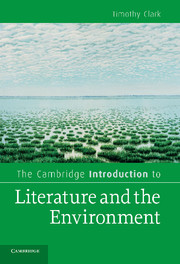Book contents
- Frontmatter
- Contents
- List of illustrations
- Preface
- Acknowledgements
- Introduction
- Romantic and anti-romantic
- The boundaries of the political
- Science and the struggle for intellectual authority
- Chapter 14 Science and the crisis of authority
- Chapter 15 Science studies
- Chapter 16 Evolutionary theories of literature
- Chapter 17 Interdisciplinarity and science
- The animal mirror
- Notes
- Further reading
- Index
- Cambridge Introductions to …
Chapter 17 - Interdisciplinarity and science
Two essays on human evolution
Published online by Cambridge University Press: 05 June 2012
- Frontmatter
- Contents
- List of illustrations
- Preface
- Acknowledgements
- Introduction
- Romantic and anti-romantic
- The boundaries of the political
- Science and the struggle for intellectual authority
- Chapter 14 Science and the crisis of authority
- Chapter 15 Science studies
- Chapter 16 Evolutionary theories of literature
- Chapter 17 Interdisciplinarity and science
- The animal mirror
- Notes
- Further reading
- Index
- Cambridge Introductions to …
Summary
Ian Marshall observes that ‘If there is a methodology that sets ecocriticism apart from other modes of literary scholarship, it is its inherent interdisciplinary nature.’ This chapter examines the mode, stakes and success of two interdisciplinary essays that engage the difficult space between the natural sciences and the humanities. How do differing kinds of intellectual method, generic expectation and convention negotiate this space?
One text is an autobiographical and speculative essay in ecocriticism, Marshall's own ‘Tales of the Wonderful Hunt’ (2003), concerning evolution, literature of the hunt and the author's own peculiar experiment with hunting. The other is Stephen Jay Gould's ‘Posture Maketh the Man’ of 1977, on how cultural assumptions about human brain size led to misreadings of human evolution. Both the relaxed essay form of Marshall and the popular science essay of Gould knowingly refuse to stay within the recognised boundaries of single academic disciplines. Both, in different ways, exemplify Julie Thompson Klein's argument that ‘[all] interdisciplinary work is critical in that it exposes the inadequacies of the existing organization of knowledge to accomplish given tasks’.
Let us take the seemingly more straightforward piece of writing first. Gould, who died in 2002, remains famous as a populariser of natural history. His very success as a writer made him controversial as a scientist, for his essays were widely seen as giving his own idiosyncratic theory of evolution (‘punctuated equilibrium’) a public authority it did not really warrant.
- Type
- Chapter
- Information
- The Cambridge Introduction to Literature and the Environment , pp. 171 - 178Publisher: Cambridge University PressPrint publication year: 2011

